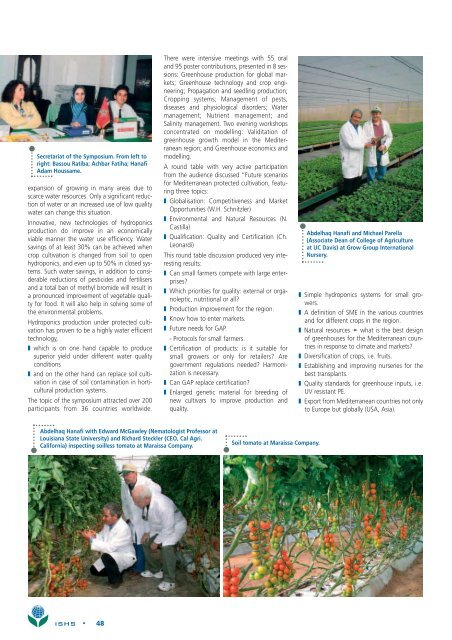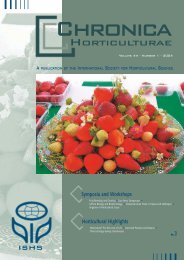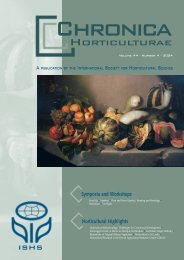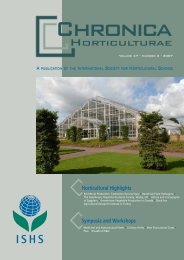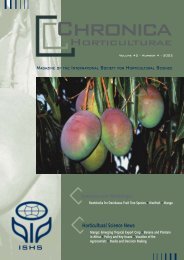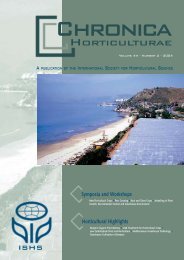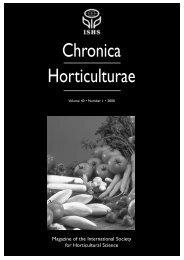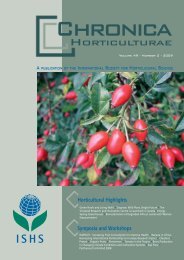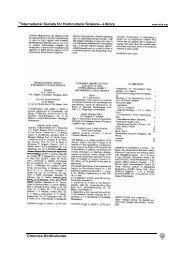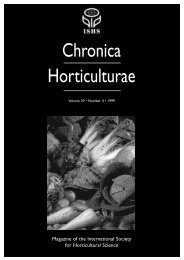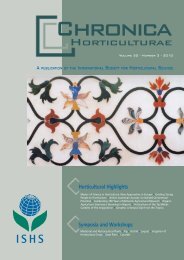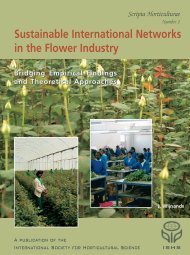Acta Horticulturae
Acta Horticulturae
Acta Horticulturae
You also want an ePaper? Increase the reach of your titles
YUMPU automatically turns print PDFs into web optimized ePapers that Google loves.
Secretariat of the Symposium. From left to<br />
right: Bassou Ratiba; Achbar Fatiha; Hanafi<br />
Adam Houssame.<br />
expansion of growing in many areas due to<br />
scarce water resources. Only a significant reduction<br />
of water or an increased use of low quality<br />
water can change this situation.<br />
Innovative, new technologies of hydroponics<br />
production do improve in an economically<br />
viable manner the water use efficiency. Water<br />
savings of at least 30% can be achieved when<br />
crop cultivation is changed from soil to open<br />
hydroponics, and even up to 50% in closed systems.<br />
Such water savings, in addition to considerable<br />
reductions of pesticides and fertilisers<br />
and a total ban of methyl bromide will result in<br />
a pronounced improvement of vegetable quality<br />
for food. It will also help in solving some of<br />
the environmental problems.<br />
Hydroponics production under protected cultivation<br />
has proven to be a highly water efficient<br />
technology,<br />
❚ which is on one hand capable to produce<br />
superior yield under different water quality<br />
conditions<br />
❚ and on the other hand can replace soil cultivation<br />
in case of soil contamination in horticultural<br />
production systems.<br />
The topic of the symposium attracted over 200<br />
participants from 36 countries worldwide.<br />
There were intensive meetings with 55 oral<br />
and 95 poster contributions, presented in 8 sessions:<br />
Greenhouse production for global markets;<br />
Greenhouse technology and crop engineering;<br />
Propagation and seedling production;<br />
Cropping systems; Management of pests,<br />
diseases and physiological disorders; Water<br />
management; Nutrient management; and<br />
Salinity management. Two evening workshops<br />
concentrated on modelling: Validitation of<br />
greenhouse growth model in the Mediterranean<br />
region; and Greenhouse economics and<br />
modelling.<br />
A round table with very active participation<br />
from the audience discussed “Future scenarios<br />
for Mediterranean protected cultivation, featuring<br />
three topics:<br />
❚ Globalisation: Competitiveness and Market<br />
Opportunities (W.H. Schnitzler)<br />
❚ Environmental and Natural Resources (N.<br />
Castilla)<br />
❚ Qualification: Quality and Certification (Ch.<br />
Leonardi)<br />
This round table discussion produced very interesting<br />
results:<br />
❚ Can small farmers compete with large enterprises?<br />
❚ Which priorities for quality: external or organoleptic,<br />
nutritional or all?<br />
❚ Production improvement for the region.<br />
❚ Know how to enter markets.<br />
❚ Future needs for GAP.<br />
- Protocols for small farmers.<br />
❚ Certification of products: is it suitable for<br />
small growers or only for retailers? Are<br />
government regulations needed? Harmonization<br />
is necessary.<br />
❚ Can GAP replace certification?<br />
❚ Enlarged genetic material for breeding of<br />
new cultivars to improve production and<br />
quality.<br />
Abdelhaq Hanafi and Michael Parella<br />
(Associate Dean of College of Agriculture<br />
at UC Davis) at Grow Group International<br />
Nursery.<br />
❚ Simple hydroponics systems for small growers.<br />
❚ A definition of SME in the various countries<br />
and for different crops in the region.<br />
❚ Natural resources ➛ what is the best design<br />
of greenhouses for the Mediterranean countries<br />
in response to climate and markets?<br />
❚ Diversification of crops, i.e. fruits.<br />
❚ Establishing and improving nurseries for the<br />
best transplants.<br />
❚ Quality standards for greenhouse inputs, i.e.<br />
UV resistant PE.<br />
❚ Export from Mediterranean countries not only<br />
to Europe but globally (USA, Asia).<br />
Abdelhaq Hanafi with Edward McGawley (Nematologist Professor at<br />
Louisiana State University) and Richard Steckler (CEO, Cal Agri.<br />
California) inspecting soilless tomato at Maraissa Company.<br />
Soil tomato at Maraissa Company.<br />
ISHS • 48


